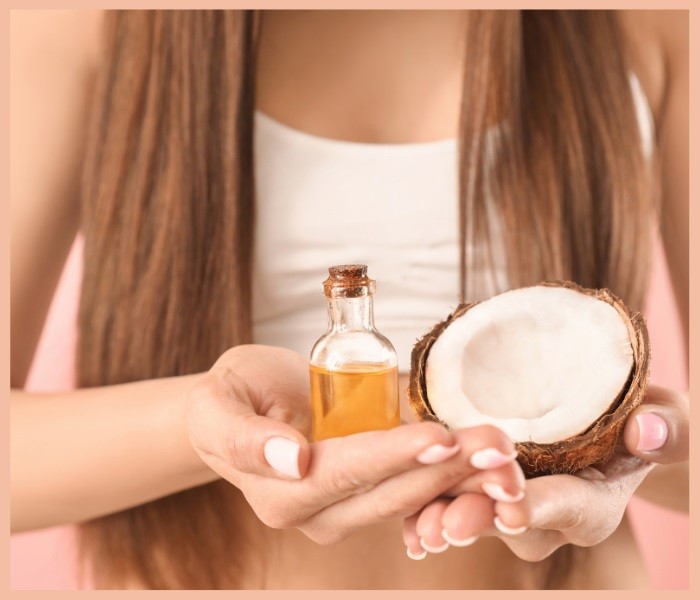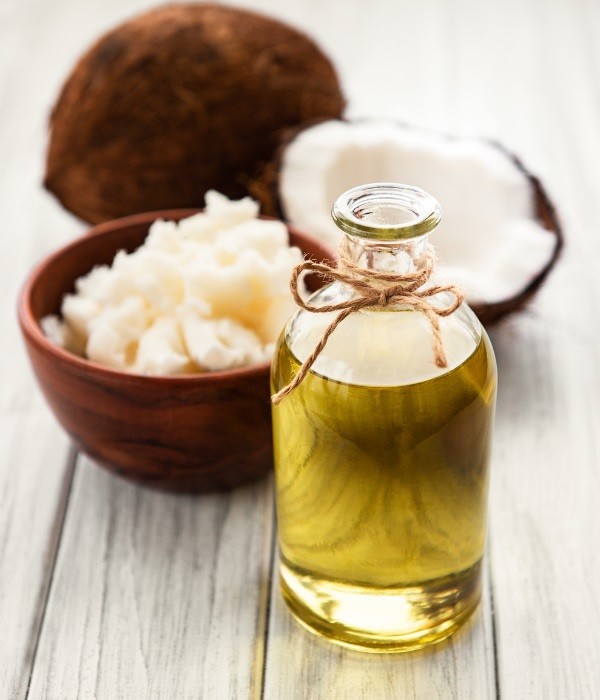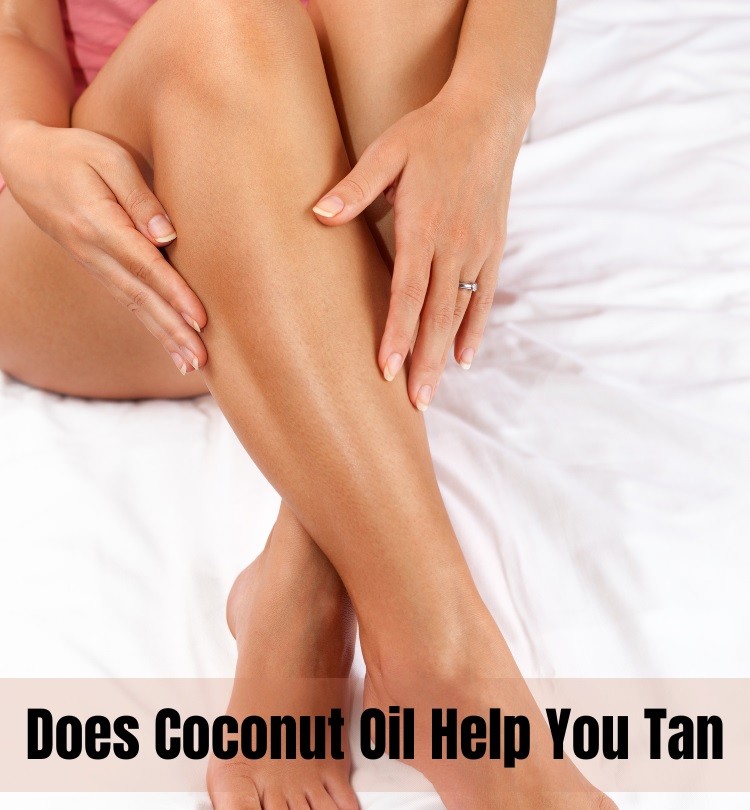This post contains affiliate links.
Updated on April 13, 2025
Coconut oil does not help you tan. Despite popular belief, there is no scientific evidence that coconut oil accelerates the tanning process.
Coconut oil provides valuable benefits to the skin when applied topically. Coconut oil has been a buzzword in the beauty industry for quite some time due to its various skin benefits. It is rich in fatty acids that deeply moisturize the skin, making it a popular ingredient in many skincare products.
Some people claim that coconut oil can also enhance tanning by accelerating the production of melanin in the skin. There is no scientific evidence to support this claim, and it’s important to note that coconut oil does not have any SPF protection. In fact, using coconut oil as a tanning oil can be harmful as it can increase the risk of sunburn and skin damage. Despite this, coconut oil is still a valuable addition to any skincare routine as it nourishes and hydrates the skin.
Contents
The Science Behind Tanning And Coconut Oil
When it comes to getting a beautiful tan, people often overlook the importance of understanding the science behind tanning. While many factors contribute to the tanning process, the role of UV rays cannot be denied. So, how does coconut oil come into play?
Let’s find out.
How Tanning Works?
Tanning is a process where your skin produces a pigment called melanin, which protects you from UV radiation. It’s your body’s natural way of protecting itself from harmful rays. As you spend time in the sun or tanning booth, your skin gradually darkens, which is an indication that your skin is producing more melanin.

The Role Of UV Rays In Tanning
Uv rays are the primary cause of skin damage and tanning. The sun emits two types of UV rays – uva and UVB. Uva rays penetrate the deepest layers of your skin and cause long-term damage, while UVB rays affect the upper layers and cause sunburn and tanning.
Related: How To Use Tanning Oil?
Introduction To Different Types Of UV Rays
- Uva rays: Penetrate deep into your skin and contribute to premature aging and skin damage.
- Uvb rays: Affect the top layer of your skin and cause sunburn and tanning.
Both types of UV rays are harmful to your skin and can cause long-term damage.
How Coconut Oil Works In Tanning
Coconut oil is a natural oil extracted from the meat of mature coconuts. It is widely popular for its moisturizing properties and has gained attention as a tanning oil. Here’s how:
- Coconut oil acts as a natural sunscreen that blocks up to 20% of UV rays.
- It keeps your skin hydrated, reducing the chances of sunburn that can negatively affect your tanning process.
- Coconut oil contains lauric acid, which helps to intensify your skin’s melanin production, helping you to tan faster.
Explanation Of Lauric Acid In Coconut Oil And How It Affects Tanning
Lauric acid is a saturated fatty acid that is abundant in coconut oil. It is known to have antimicrobial properties and acts as a natural sunscreen. When you apply coconut oil to your skin before tanning, lauric acid helps to stimulate melanin production, the pigment that gives your skin its darkened color.
The result is a deeper, richer tan that lasts longer.
Understanding the science behind tanning can help you achieve a better, long-lasting tan. While coconut oil is an excellent natural tanning oil, you should still practice proper sun safety measures and limit your sun exposure to prevent skin damage. Remember, a beautiful tan is only one part of healthy skin.
The Benefits Of Using Coconut Oil For Tanning

Many people believe that using coconut oil for tanning can help achieve a darker and longer-lasting tan. There are many more benefits to using coconut oil for tanning than just an excellent tan. Here are some of the key benefits of using coconut oil for tanning:
Natural Sunblock Feature Of Coconut Oil
Coconut oil has a natural SPF of 4-5, which is low but can still protect your skin from the harmful UV rays of the sun. Applying coconut oil before going out in the sun will provide some protection. It is not a substitute for sunblock, especially if you have fair skin or are prone to sunburns.
- Coconut oil has a natural SPF of 4-5
- It provides some protection from the sun
- It is not a substitute for sunblock
Long-Lasting Effects Of Using Coconut Oil For Tanning
One of the most significant benefits of using coconut oil for tanning is that it can help extend the duration of your tan. Coconut oil helps to moisturize your skin, which can prevent premature peeling of your skin and fading of your tan.
- Coconut oil can help extend the duration of your tan
- It prevents premature peeling of your skin
- It prevents fading of your tan
Moisturizing Properties Of Coconut Oil And How They Benefit The Skin
Coconut oil is an excellent moisturizer for your skin. It can help keep your skin hydrated and prevent dryness and flakiness. Additionally, it can also improve the overall texture and elasticity of your skin, making it look healthy and radiant.
- Coconut oil is an excellent moisturizer
- It keeps your skin hydrated and prevents dryness
- It improves the overall texture and elasticity of your skin
Protection Against Sunburn And Skin Damage
Using coconut oil for tanning can also provide protection against sunburn and skin damage. The natural oils in coconut oil can help soothe and calm inflamed skin caused by sunburn. Additionally, it has antioxidants that can help protect your skin against free radicals and skin damage.
- Coconut oil helps soothe and calm inflamed skin caused by sunburn
- It has antioxidants that protect your skin against free radicals
- It can protect against skin damage
Using coconut oil for tanning has numerous benefits that go beyond achieving a dark and long-lasting tan. It has natural sunblock features, moisturizing properties, and protection against sunburn and skin damage. Nevertheless, it cannot replace sunblock, and it is vital to stay protected when you go out in the sun.
Related: Can You Use Tanning Oil In A Tanning Bed?
The Risks And Drawbacks Of Using Coconut Oil For Tanning

Risks Associated With Overexposure To Uv Rays
While coconut oil does offer some natural protection from UV rays, it is still important to note that overexposure to the sun can cause significant damage to the skin, including sunburn, premature aging, and an increased risk of skin cancer.
Using coconut oil alone may not provide enough protection, especially if you have fair skin or are spending extended periods in direct sunlight.
To reduce your risk of sun damage, it is important to wear protective clothing, seek shade during peak sun hours, and regularly apply a high-SPF sunscreen.
Skin Allergies And Irritations
While coconut oil is generally safe for most people, it is possible to have an allergic reaction or irritation from using it on the skin. This can be especially true for those with sensitive skin or allergies to coconut oil itself.
Symptoms of an allergic reaction or irritation can include redness, itching, swelling, and hives. If you experience any of these symptoms, stop using coconut oil and seek medical attention if necessary.
The Impact Of Coconut Oil On Skin Pigmentation
There is some evidence to suggest that using coconut oil for tanning can help to enhance and deepen your natural skin pigmentation. However, this effect is not guaranteed, and it may not be noticeable to everyone. Additionally, overexposure to UV rays can cause skin discoloration or uneven pigmentation, which is a risk that should be considered when deciding whether to use coconut oil for tanning.
Negative Environmental Impact Of Using Coconut Oil For Tanning
While coconut oil is a natural product, it is important to consider the environmental impact of using it for tanning. When it is applied to the skin, it can easily transfer to clothing, towels, and other surfaces, and may not wash out easily in the laundry.
This can lead to stains and damage to clothing, as well as pollution of water sources.
To mitigate the environmental impact, it is important to use coconut oil sparingly and consider using alternatives such as self-tanning products or tinted sunscreen.
While coconut oil can certainly have benefits for tanning, it is important to consider the risks and drawbacks. By taking steps to protect your skin from overexposure to UV rays, monitoring for allergic reactions or irritations, understanding the impact on skin pigmentation, and considering the environmental impact, you can make an informed decision about whether or not to use coconut oil for tanning.
Remember, the best way to maintain healthy skin is to protect it from damage and practice safe and responsible sun exposure habits.
Related: Does Olive Oil Help You Tan?
Alternative Options For Tanning
While coconut oil has gained popularity as a natural tanning option, there are various other natural oils that may be used for tanning. Some of these options include:
- Olive oil: Extra virgin olive oil is rich in antioxidants and is known to moisturize the skin, making it a popular tanning option.
- Sunflower oil: Sunflower oil is rich in beta-carotene and can help improve skin texture and tone.
- Argan oil: Argan oil is known for its anti-aging properties and has high levels of vitamin E, making it an excellent option for hydrating and nourishing the skin.
- Wheatgerm oil: This oil is high in vitamin E and also contains essential fatty acids that can help in the production of collagen, which may improve skin elasticity.
Benefits And Risks Associated With Using Other Oils
While natural oils have their benefits, there are also several risks associated with using them for tanning. Here are some of the benefits and risks of using natural oils:
Benefits:
- They can help moisturize and hydrate the skin
- They are often rich in nutrients and antioxidants, which can help improve skin health
- They are a natural alternative to synthetic tanning products
Risks:
- They may not provide enough protection against UV rays, increasing the risk of sunburn and skin damage
- Some oils may clog pores and cause breakouts
- People with nut allergies may have adverse reactions to certain oils
Comparison Of Tanning Oils With Other Tanning Alternatives Such As Spray Tans
When comparing tanning oils to other tanning options such as spray tans, there are several factors to consider. Here are some key differences between the two:
Tanning oils:
- They are a natural alternative to synthetic tanning products
- They may not provide as much coverage as a spray tan
- They can be messy and may stain clothes or other fabrics
Spray tans:
- They provide even coverage and may last longer than tanning oils
- They are a quick and easy alternative to sun exposure or tanning beds
- They require upkeep, as the tan may fade unevenly
The best tanning option will depend on personal preference and skin type.
Frequently Asked Questions
Is Coconut Oil Effective For Tanning?
Yes, it can help you tan due to its natural SPF properties.
How Does Coconut Oil Improve Tanning?
Coconut oil helps keep skin hydrated, promotes melanin production, and protects from UV damage.
Can Coconut Oil Help Prevent Sunburn?
Coconut oil has a natural SPF of around 4-5 which can offer some protection against sunburn.
Does Coconut Oil Darken The Skin?
Yes, over time coconut oil can darken skin due to its moisturizing and tanning properties.
How Often Should I Use Coconut Oil For Tanning?
Using coconut oil once or twice a day throughout the tanning process can help achieve the desired results.
Conclusion
Overall, coconut oil has its fair share of benefits when it comes to tanning. Not only does it provide hydration and protection against harmful UV rays, but it can also help to enhance and prolong a tan. It’s important to note that coconut oil doesn’t work for everyone, and it’s not a substitute for traditional sunscreen.
Those with fair skin or a history of skin cancer should be particularly cautious when using coconut oil for tanning. As with any product, it’s crucial to do your research and consult with a dermatologist if necessary. With that being said, if you’re looking for a natural and cost-effective way to enhance your tan, coconut oil may be worth a try.

